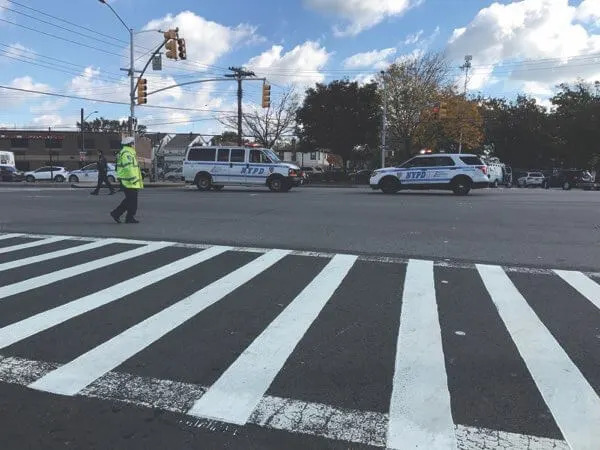By Cynthia Koons
They are armed, drive cars with sirens and have been instrumental in some of New York's most high-profile cases, including the arrests of junk bond king Michael Milken on insider trading charges and TV evangelist Jimmy Bakker on fraud and conspiracy charges.Yet little is known about these covert officers of the law.Members of the oldest federal law enforcement agency in the country, postal police and inspectors remain largely anonymous on purpose.”Our unofficial nickname has been 'the silent service,'” postal inspector Allan Weissmann said. “For many years the powers that be thought staying out of the press made us more effective.”They are the post office's own little FBI.Weissmann worked in the Whitestone headquarters of the Queens postal police, at the corner of 150th Street and the Cross Island Parkway, for seven years up until two months ago when he was relocated to the Manhattan office. The Whitestone agency, which protects the entire borough, is manned 24 hours a day, seven days a week. About 36 postal police officers are assigned to that office as well as 10 private security guards and eight inspectors, Weissmann said.The officers in the Whitestone office are part of a mail theft team who are called upon in a variety of different criminal situations.”They investigate everything from the actual theft of letters and parcels to identity thefts,” Weissmann said.Just two weeks ago, they were called into action when two armed men charged into the South Ozone Park post office and forced three female clerks and the 9-year-old daughter of a worker into the facility's vault.”Our mission is to protect postal assets, postal employees, postal customers and to protect the postal system from criminal attack,” Weissmann said. “We don't consider ourselves above the postal service, we're here to protect the postal service.”Anthrax scares had New York postal inspectors on their toes in the months after the Sept. 11, 2001 attacks. Since then, Weissmann said postal inspectors have had to focus their energies on identity theft – a crime that commonly involves mail fraud.Capt. Thomas Pilkington, commanding officer of the 111th Precinct in Bayside, said postal inspectors play a unique role in law enforcement.”We really don't have any jurisdiction when it comes to the post office, that's why we need them,” he said. “They can go with a lot of the federal statutes, which are a lot more stringent than the state statutes.”Since postal inspectors are not confined to state boundaries like city police are, Pilkington said the agents are able to investigate Internet-related crimes in ways regular police officers cannot.”Since they're postal, they don't have any boundaries,” Pilkington said. “My jurisdiction ends at the state line. With any Internet scam, there's postal police in Texas and California who can help.”Weissmann said most people do not realize that any crime involving mail falls under the postal inspectors' jurisdiction.For that reason, a number of the Wall Street insider trading arrests happen to have involved postal inspectors. Postal agents are not allowed to open mail without a search warrant, but they are permitted to begin investigations when approached by a victim.Weissmann referred to it as the “sanctity of the seal.” Once cases are ready for prosecution, he said District Attorney Richard Brown's office often handles what the U.S. attorney cannot.”They investigate cases not only of money laundering cases, crimes that take place where defendant use the U.S. mail,” said Robert Nardoza, a spokesman for the U.S. attorney's office for the Eastern District. “They also investigate crimes involving the Internet. There's a whole host of criminal investigations that they're involved in.”In November, for example, postal inspectors were integral in the arrests of a Jamaica funeral director and his wife who were brought down on charges that they defrauded $3.1 million from the New York Life Insurance, Met Life, and John Hancock Life Insurance companies. The couple allegedly obtained life insurance policies on people both real and fictitious and created false death certificates to file claims and collect money from the companies. Postal inspectors from the mail fraud team were able to intervene and charge the pair with conspiracy to commit mail fraud. The postal laws on the books today are more than 100 years old, Weissmann said, and the very existence of postal inspectors or police dates back to the 1700s.”People say Ben Franklin established surveyors that protected postal routes during colonial times,” he said.To be a postal inspector today, an applicant must be younger than 37, have a four-year college degree, take a postal test, be subjected to an extensive background test and complete three months of training at the postal inspector academy in Potomac, Md. Postal police are required to have a clean record, a valid driver's license, and writing, reading and math skills in order to apply to the service. They spend six weeks at the training academy before being sworn into the service.The rigorous application process ensures that those enlisted in the law enforcement arm of the U.S. post office are dedicated to their work.”I'm not sure what the public's perception is. Postal employees and certainly management, they really truly care about getting this job done right,” Weissmann said. “A lot of them really take the job home. It's not that stereotypical, 'It's 5 o'clock, I'm getting outta here,' kind of thing.”Reach reporter Cynthia Koons by e-mail at news@timesledger.com or call 718-229-0300, Ext. 141.
































